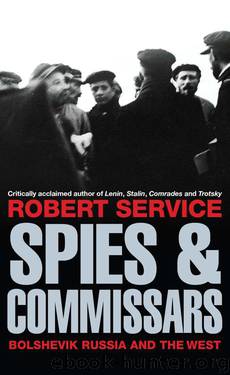Spies and Commissars by Service Robert

Author:Service, Robert [Service, Robert]
Language: eng
Format: epub
ISBN: 9780230760950
Publisher: Macmillan Publishers UK
Published: 2011-11-03T22:00:00+00:00
Dukes travelled about Russia under the alias of artillery commander V. Piotrovski.56 The runaway pianist became a Red Army officer who filed regular reports to London from whatever place he was moved to.
He had just as many adventures as Hill. Whereas Dukes was modest and discreet in his memoirs, it would seem that he personally rescued two of the former emperor’s nieces, making himself into a human bridge across a dyke at one point. A couple of Englishwomen also owed their lives to him, as did a merchant called Solatin who had tumbled from wealth and influence to destitution after 1917. Dukes and his couriers ran fearful risks – at least one of them was trapped and shot by the Cheka. He was once pursued so hotly that he hid in a tomb in a graveyard. The sight of him emerging from it next morning terrified a passer-by.57 But he was not just the Pimpernel. His couriers helped him finance counter-revolutionary enterprises and gather information that was urgently needed in London – and one of his subordinates fondly recorded him as having been a person of great decency.58 The reports that Dukes relayed to the Secret Service Bureau were concise and vivid. He treasured the spectacle of striking workers who sang the Marseillaise while carrying a banner that read: ‘Down with Lenin and horse meat, up with the Tsar and pork!’59
Whatever may explain the disarray of Western policy and activity in Russia, it was not the absence of efficient spying networks. In 1918 the British were already picking up Soviet cable traffic to Europe – and when in June they came across a message from Trotsky to Litvinov, they kept it for their own information and prevented it from reaching Litvinov.60 In the following year a Government Code and Cypher School was created on Lord Curzon’s recommendation and quickly proved its worth. Among its employees was the leading former Russian Imperial cryptanalyst Ernst Fetterlein, who provided his services after escaping Soviet Russia. Fetterlein was the first director of the School and scarcely any wireless traffic from Moscow was invulnerable to his attention and that of his Russian colleagues.61
Although it had been the American spy network that suffered worst in the Cheka raids of September 1918, the US never let up in its activity in wireless interception. Chicherin conducted a lively traffic with Baron Rosen in Berlin seeking a rapprochement between Germany and Soviet Russia; he had no inkling that the Americans were regularly scrutinizing these exchanges.62 The German Foreign Office was divided into two factions, one supporting an alliance and the other wanting to postpone any decision. The first faction saw the communist governments of Russia and Hungary as offering good trading opportunities for Germany; its advocates supposed that this was achievable on the agreed basis that communism would not be exported into German cities and that Lenin would come to terms with a ‘social-democratic or democratic government’. At a time when Denikin’s forces were trampling Red resistance in southern
Download
This site does not store any files on its server. We only index and link to content provided by other sites. Please contact the content providers to delete copyright contents if any and email us, we'll remove relevant links or contents immediately.
| Arms Control | Diplomacy |
| Security | Trades & Tariffs |
| Treaties | African |
| Asian | Australian & Oceanian |
| Canadian | Caribbean & Latin American |
| European | Middle Eastern |
| Russian & Former Soviet Union |
The Secret History by Donna Tartt(19006)
The Social Justice Warrior Handbook by Lisa De Pasquale(12178)
Thirteen Reasons Why by Jay Asher(8874)
This Is How You Lose Her by Junot Diaz(6859)
Weapons of Math Destruction by Cathy O'Neil(6251)
Zero to One by Peter Thiel(5770)
Beartown by Fredrik Backman(5719)
The Myth of the Strong Leader by Archie Brown(5482)
The Fire Next Time by James Baldwin(5414)
How Democracies Die by Steven Levitsky & Daniel Ziblatt(5200)
Promise Me, Dad by Joe Biden(5132)
Stone's Rules by Roger Stone(5066)
A Higher Loyalty: Truth, Lies, and Leadership by James Comey(4941)
100 Deadly Skills by Clint Emerson(4901)
Rise and Kill First by Ronen Bergman(4764)
Secrecy World by Jake Bernstein(4729)
The David Icke Guide to the Global Conspiracy (and how to end it) by David Icke(4687)
The Farm by Tom Rob Smith(4490)
The Doomsday Machine by Daniel Ellsberg(4475)
